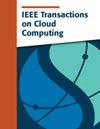学习优化边缘云计算环境的工作流调度
IF 5.3
2区 计算机科学
Q1 COMPUTER SCIENCE, INFORMATION SYSTEMS
引用次数: 0
摘要
智能物联网(IoT)设备的广泛部署对工作流等复杂工作负载模式提出了更严格的延迟要求。在此类应用中,会产生大量数据流并根据特定服务链进行处理。边缘计算在减少核心网络流量和缓解云数据中心分散的计算需求方面的可行性已得到证明。然而,对于智能物联网范例来说,在边缘-云混合网络中高效调度工作流仍具有挑战性。现有作品在实际执行之前就做出调度决策,难以应对环境的动态性。因此,调度器既受到调度策略的影响,也受到动态工作负载的相互影响。我们设计了一种智能工作流调度器,可用于工作负载持续稳定到达的边缘云网络。我们开发了新的基于图神经网络(GNN)的任务嵌入表示法,并设计了基于近端策略优化(PPO)的在线学习调度程序。我们进一步引入了内在奖励,以获得对调度决策的即时评估,并即时修正调度策略。数值结果验证了我们建议的可行性,因为它在提高服务质量(QoS)水平方面优于现有作品。本文章由计算机程序翻译,如有差异,请以英文原文为准。
Learning to Optimize Workflow Scheduling for an Edge–Cloud Computing Environment
The widespread deployment of intelligent Internet of Things (IoT) devices brings tighter latency demands on complex workload patterns such as workflows. In such applications, tremendous dataflows are generated and processed in accordance with specific service chains. Edge computing has proven its feasibility in reducing the traffic in the core network and relieving cloud datacenters of fragmented computational demands. However, the efficient scheduling of workflows in hybrid edge–cloud networks is still challenging for the intelligent IoT paradigm. Existing works make dispatching decisions prior to real execution, making it difficult to cope with the dynamicity of the environment. Consequently, the schedulers are affected both by the scheduling strategy and by the mutual impact of dynamic workloads. We design an intelligent workflow scheduler for use in an edge–cloud network where workloads are generated with continuous steady arrivals. We develop new graph neural network (GNN)-based representations for task embedding and we design a proximal policy optimization (PPO)-based online learning scheduler. We further introduce an intrinsic reward to obtain an instantaneous evaluation of the dispatching decision and correct the scheduling policy on-the-fly. Numerical results validate the feasibility of our proposal as it outperforms existing works with an improved quality of service (QoS) level.
求助全文
通过发布文献求助,成功后即可免费获取论文全文。
去求助
来源期刊

IEEE Transactions on Cloud Computing
Computer Science-Software
CiteScore
9.40
自引率
6.20%
发文量
167
期刊介绍:
The IEEE Transactions on Cloud Computing (TCC) is dedicated to the multidisciplinary field of cloud computing. It is committed to the publication of articles that present innovative research ideas, application results, and case studies in cloud computing, focusing on key technical issues related to theory, algorithms, systems, applications, and performance.
 求助内容:
求助内容: 应助结果提醒方式:
应助结果提醒方式:


